Fleurs du Mal Magazine


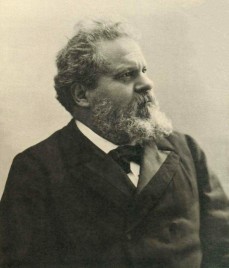
Dante
Strong forms were those of the New Life, that stood
Around thy cradle,
O Master of the song that looks above!
A brave young giantess,
Unknown before to Greek or Latin shores,
Daring in love and hate, and fair withal,
Came Tuscan Libertade, and the child
Already with bounteous breast did comfort thee.
And all a-glowing with her spheral rays,
Mild and austere in one,
Came Faith: and she, across a shore
Obscure with crowds of visions and of shades,
Opened for thee the Gate of the Infinite.
Sighing and pensive, yet with locks aglow
With rosy splendour from another air,
Love made long stay.
And such the gentle things
He talked to thee with bashful lips, so sweetly
He entered all the chambers of thy heart,
That no one ever knew to love like thee.
But soon away from lonely meditating,
O youthful recluse,
Wild clamour and fierce tumult tore thee, and
The fury of brothers seeking brothers’ blood.
Thou heard’st the hissing flames of civil war
On neighbour’s walls; thou heardest women shriek
To heaven that altars and the marriage bed,
The dear hearth-stone and the infant’s cradle,—
All that made fair the marital abode,
Were swept away in one great gulf of flame.
Their men had rushed from their embrace to arms;
The youth breathed only anger and destruction.
Thou sawest the raging of swords
Seeking the breast-plunge;
Thou heardest the dying warrior
Blaspheme and curse:
Before thee, streaming with gore,
Gold locks and grey;
And the Furies offering
To Liberty the execrated host
Of human victims;
And Death, the cruel arbiter of fates,
Crumbling the mighty towers and opening
The long-barred gates.
Amid wild scenes
So grew thy Italian soul,
And prayed that the long civil hate might end.
Meanwhile he saw
Of love such pure revealings and so strange,
The which depicted in the shade
Of a young myrtle-tree,
Each one who saw must bow the head in reverence.
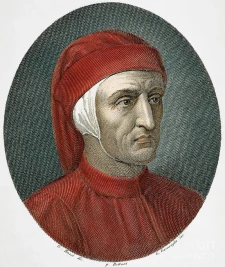
But o’er this gentle dream
There came the voice of weeping,
Bitterly sounding from the maternal source.
Alas! broken by the whirlwind,
Lies the fair myrtle,
And with wide-spread wings
The dove of sweet affection is flown forth
To seek a purer aura for its flight.
He, driven here and there
In the thick darkness of the turbulent age,
Sought refuge with the famous shades of old;
So learned to hate himself and present things.
And in the twilight came he forth a giant,
Seeming a shade himself—an angry shade
Who through the desert went from tomb to tomb,
Now questioning and now embracing them:
Until before him rose across the ruin
And dust of these barbaric ages gone,
Like a cloudy pillar, the ancient Latin valour.
Then all that such a ruin tells did burst
Upon the silent air in one great cry.
In the exalted vision
Arose the poet divine; and now, disdaining
His stricken land and time that only wasted
In petty aimless strife the ancient strength,
He, in the seeing of his heart’s desire,
Saluted thee, O modern Italy,—
One, in thy valiant arms, thy laws, thy speech.
And then, to truly tell
What such a vision meant, he sought to know
The life that rolls through all the sea of being.
From beneath the dust of buried centuries
He made things good and ill to tell their tale
Through him the fatal prophet: till his voice
Resounded through the world, and made the ages
Turn and behold themselves. Judge and lord,
He placed them where they could themselves behold,
Admired and wept, disdained and laughed at them;
Then shut them up in his eternal song,
Well pleased that he had power to do this much.
And meanwhile this poor tangle
Where the weeping and the wailing still goes on,
This endless fraud and shadow
Which has the name of life and is so base,—
All this didst thou despise! Thy sacred muse
Explored the depths of all the universe.
Following the good gentile Philosopher
Who placed thee in the midst of secret things,
Thou didst desire to see as angels see
There where there is no intervening veil;
And thou wouldst love as they do love in heaven.
Up through the ways of love
The humble creature
Pushing his way to the Creator’s presence,
Wished to find rest in that eternal Truth
Which taught thee the great love and the great thought.
Here Virgil failed thee,
And thou, deserted,
A lonely human spirit as if drowned
Within the abyss of thy immense desire,
Didst vanish overwhelmed in doubt,—
When as on wings
Angelical there came unto thy grief
She who is love and light and vision
Between the understanding and the True.
No mortal tongue like mine may give her name,
But thou who lovedst didst call her Beatrice.
And so from sphere to sphere
‘T was naught but melody that thou didst hear,
‘T was naught but one great light that thou didst see,
And every single sense thou hadst was love,
And verse and spirit made one harmony
Like unto her who there revealed herself.
Alas! what caredst thou then
For thy poor country and the endless strife
That rent its cities like, alas! even those
That make forever dark the vales of hell!
From heaven descending thou didst thrice bring down
The Hymn Supreme, and all the while there shone
Upon thy brow a radiance divine
Like his who spake with God in Sinai.
Before thee shining
In all the splendour of the holy Kingdom
Flashed in its crimson light the mortal field
Of Montaperto, and along the wastes
Deserted and malignant came the sound,
Dreary and dull, of dying warriors’ sighs:
To which far off responded
With a great cry of mingled human woe
The cursed battle-field of Campaldino.
And thou, Rea Meloria,
Didst rise from the Tuscan sea
To tell the glory of this horrid slaughter,
And of the Thyrrenian shores made desolate
With this our madness, and the sea’s great bosom
All stained with blood, and far Liguria’s strand
Filled with the moan of lonely Pisan exiles
And children born for fratricidal war.
Giosuè Carducci
(1835 – 1907)
Dante
• fleursdumal.nl magazine
More in: # Classic Poetry Archive, Archive C-D, Archive C-D, Dante Alighieri
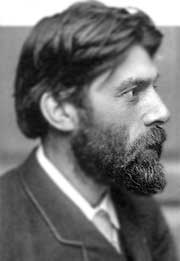
Low Barometer
The south-wind strengthens to a gale,
Across the moon the clouds fly fast,
The house is smitten as with a flail,
The chimney shudders to the blast.
On such a night, when Air has loosed
Its guardian grasp on blood and brain,
Old terrors then of god or ghost
Creep from their caves to life again;
And Reason kens he herits in
A haunted house. Tenants unknown
Assert their squalid lease of sin
With earlier title than his own.
Unbodied presences, the pack’d
Pollution and remorse of Time,
Slipp’d from oblivion reënact
The horrors of unhouseld crime.
Some men would quell the thing with prayer
Whose sightless footsteps pad the floor,
Whose fearful trespass mounts the stair
Or burts the lock’d forbidden door.
Some have seen corpses long interr’d
Escape from hallowing control,
Pale charnel forms—nay ev’n have heard
The shrilling of a troubled soul,
That wanders till the dawn hath cross’d
The dolorous dark, or Earth hath wound
Closer her storm-spredd cloke, and thrust
The baleful phantoms underground.
Robert Bridges
(1844-1930)
Low Barometer
• fleursdumal.nl magazine
More in: Archive A-B, Archive A-B, Bridges, Robert

Het plezier van de liplezer
Hij heeft in schijnbewegingen geen trek,
verduidelijkt weifelen slechts met tegenzin.
Dat je uit de letters van liplezer plezier kunt
halen en dan zelfs nog een l overhoudt. Van
zulke kleine dingen kan hij waarlijk oprecht
genieten. Vreugde is zelden een vergissing.
Bert Bevers
Het plezier van de liplezer
Uit Bedekte termen, Stabilitas loci, Antwerpen, 2023
https://www.amazon.co.uk/Bedekte-termen-gedichten-Bert-Bevers/dp/B0C8QW1G9N
• fleursdumal.nl magazine
More in: Archive A-B, Archive A-B, Bedekte Termen
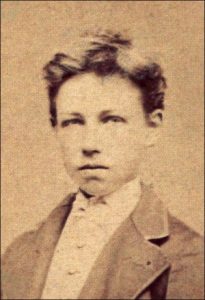
La Chambrée de nuit
Rêve
On a faim dans la chambrée –
C’est vrai…
Émanations, explosions. Un génie :
« Je suis le gruère ! » –
Lefêbvre « Keller ! »
Le génie « Je suis le Brie ! » –
Les soldats coupent sur leur pain :
« C’est la vie ! »
Le génie. – « Je suis le Roquefort ! »
– « Ça s’ra not’ mort !… »
Je suis le gruère
Et le Brie !… etc.
Valse
On nous a joints, Lefèbvre et moi, etc.
Arthur Rimbaud
(1854 – 1891)
La Chambrée de nuit
Rêve
Derniers vers
• fleursdumal.nl magazine
More in: #Editors Choice Archiv, Archive Q-R, Archive Q-R, Arthur Rimbaud, Rimbaud, Arthur
Italiaanse roman over een schooljuf en de zelfmoord van een leerlinge.
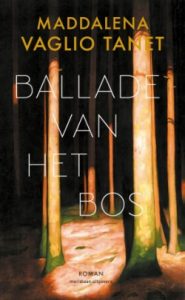 1970, een stadje aan de voet van de Alpen in Piëmont. Een juf op een basisschool vertrekt van huis, maar in plaats van naar school gaat ze het bos in. In de krant leest ze dat een van haar leerlingen uit een raam in de beek is gesprongen en is overleden. De juf verdwijnt en dagenlang volgt men de zoektocht met ingehouden adem.
1970, een stadje aan de voet van de Alpen in Piëmont. Een juf op een basisschool vertrekt van huis, maar in plaats van naar school gaat ze het bos in. In de krant leest ze dat een van haar leerlingen uit een raam in de beek is gesprongen en is overleden. De juf verdwijnt en dagenlang volgt men de zoektocht met ingehouden adem.
Degene die haar vindt is een eenzaam kind, Martino: de vrouw hallucineert, heeft honger en wordt overmand door schuldgevoelens. Martino voelt aan dat ze nog niet klaar is om terug te keren naar de wereld en bezoekt haar in het geheim, brengt haar eten en praat met haar. En toch is hij verscheurd, omdat hij weet dat de familie van de lerares wanhopig naar haar op zoek is…
Ballade van het bos is gebaseerd op een waargebeurd verhaal, gedocumenteerd door krantenartikelen en familieherinneringen. De roman stond op de longlist voor de Premio Strega 2023, een eer die slechts zeer weinig debuutromans ten deel valt.
Maddalena Vaglio Tanet studeerde literatuurwetenschap aan de Universiteit van Pisa en verhuisde daarna naar New York voor een PhD aan Columbia University. Ze werkt als literair scout. Ballade van het bos is haar debuutroman, de vertaalrechten zijn nog vóór publicatie in Italië verkocht aan het Verenigd Koninkrijk, de Verenigde Staten, Duitsland, Griekenland en Portugal. Ze woont met haar gezin in Maastricht.
Ballade van het bos
Door: Maddalena Vaglio Tanet
Paperback met flappen
Formaat: 12,5 x 20,5 cm
280 pagina’s
Meridiaan Uitgevers
Verschijningsdatum:25 april 2024
Vertaler(s): Manon Smits
EAN: 9789493305090
• fleursdumal.nl magazine
More in: - Book News, - Bookstores, Archive S-T, Suicide, Tales of Mystery & Imagination

Petrarca
If far from turbid thoughts and gloomy mood
Some smiling day should see my wish fulfilled
Where breathe the vales with gentle brooks enrilled
The soft air of my Tuscan neighbourhood,
There, where is heard no more the garrulous brood
Of thoughtless minds, in deep oblivion stilled,
Would I to thee my heart’s pure altar build
In the green blackness of the tangled wood.
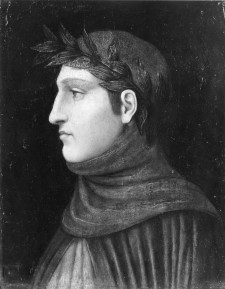
There with the dying splendours of the sun
Thy song should glow amid the flowers springing
On breezy banks where whispering streams do run;
As if, still sweeter sounds and odours flinging
Upward to heaven when the day is done,
A nightingale from bough to bough were singing.
Giosuè Carducci
(1835 – 1907)
Petrarca
• fleursdumal.nl magazine
More in: # Classic Poetry Archive, Archive C-D, Archive C-D, Archive O-P, Petrarca, Francesco
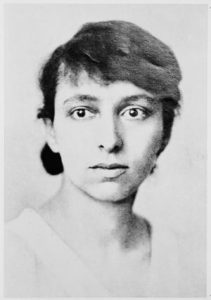
Märchen
Ich hab vor deinem Hause still gestanden
In einer Nacht.
Und hatte ganz dich lieb und ohne Maßen;
Ich wies zu dir den Sternen goldne Straßen
Und habe selig stumm gelacht.
Ob meinem losen Haar hob ich die Arme
Wie Zweige, schlank und rund.
Da stürzte Regen in das Mainachtschweigen
Und rief sich zage Blüten aus den Zweigen,
Und jede war ein blasser Mund.
Du aber kamst nicht.
So streute ich mit lächelndem Verschwenden
Dem Mond die Blumen her.
Und spürte Treiben herber, dunkler Kräfte,
Mir ward die Frucht voll süßer, süßer Säfte;
Schon fiel sie, duftend, weich und schwer.
Du aber kamst nicht.
Eishagel tanzte höhnend auf den Steinen.
Da klaffte schwarz ein Schacht.
Drein ließ ich die zerbrochnen Arme hangen. –
Geblüht und Frucht getragen – und vergangen
In einer Nacht.
Gertrud Kolmar
(1894 – 1943)
Märchen
• fleursdumal.nl magazine
More in: #Editors Choice Archiv, Archive K-L, Archive K-L, Grimm, Andersen e.o.: Fables, Fairy Tales & Stories, Holocaust, Kolmar, Gertrud
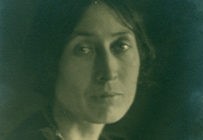
Thaw
Blow through me wind
As you blow through apple blossoms…
Scatter me in shining petals over the passers-by…
Joyously I reunite… sway and gather to myself…
Sedately I walk by the dancing feet of children—
Not knowing I too dance over the cobbled spring.
O, but they laugh back at me,
(Eyes like daisies smiling wide open),
And we both look askance at the snowed-in people
Thinking me one of them.
Lola Ridge
(1873-1941)
Thaw
• fleursdumal.nl magazine
More in: Archive Q-R, Archive Q-R, Ridge, Lola

Model
Ik merk dat wat dieper in de tram een meisje mij
bekijkt en tekent. Ze schrikt wanneer ik knipoog,
alsof onder haar potlood het papier beweegt.
Ik laat haar en denk wanneer ik uitstap ‘Dag
schetsboek met mijn anonieme kop erin! Dag
lijnenzetster die niet weet dat ik dit schrijven zal.’
Bert Bevers
Model
Uit Bedekte termen, Stabilitas loci, Antwerpen, 2023
https://www.amazon.co.uk/Bedekte-termen-gedichten-Bert-Bevers/dp/B0C8QW1G9N
• fleursdumal.nl magazine
More in: #Editors Choice Archiv, Archive A-B, Archive A-B, Bedekte Termen, Bevers, Bert
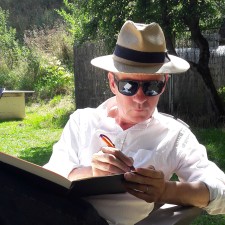
Tristram en Isolde
Tristram moest Isolde minnen,
de blauwe pil dwong hem ertoe.
Koning Mark wilde haar winnen,
op eigen kracht. Hij wist niet hoe.
De nevel drong de huizen binnen.
Haar lichaam deed de deuren toe.
Ze was klaar, zei ze, met minnen.
Ze hees haar rode zeil. Was moe.
Paul Bezembinder
Tristram en Isolde
Gedicht
Paul Bezembinder studeerde theoretische natuurkunde in Nijmegen. In zijn poëzie zoekt hij vooral in klassieke versvormen en thema’s naar de balans tussen serieuze poëzie, pastiche en smartlap. Bij uitgeverij Leeuwenhof (Oostburg) verschenen de bundels Gedichten (2020), Parkzicht (2020) en Duizelingen (2022). Website: www.paulbezembinder.nl.
• fleursdumal.nl magazine
More in: Archive A-B, Archive A-B, Bezembinder, Paul, Tristan & Isolde
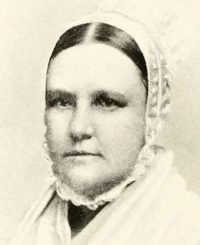
All Alone
Alas! they have left me all alone
By the receding tide;
But oh! the countless multitudes
Upon the other side!
The loved, the lost, the cherished ones,
Who dwelt with us awhile,
To scatter sunbeams on our path,
And make the desert smile.
The other side! how fair it is!
Its loveliness untold,
Its “every several gate a pearl,”
Its streets are paved with gold.
Its sun shall never more go down,
For there is no night there!
And oh! what heavenly melodies
Are floating through the air!
How sweet to join the ransomed ones
On the other side the flood,
And sing a song of praise to Him
Who washed us in His blood.
Ten thousand times ten thousand
Are hymning the new song!
O Father, join Thy weary child
To that triumphant throng!
But oh! I would be patient,
“My times are in Thy hand,”
“And glory, glory dwelleth
In Immanuel’s land.”
Eliza Paul Kirkbride Gurney
(1801 – 1888)
All Alone
• fleursdumal.nl magazine
More in: # Classic Poetry Archive, Archive G-H, Archive G-H

Madrigal
Breaking his way through the white clouds in the azure,
The sun laughs out and cries:
“O Springtime, come!”
Across the greening hills with placid murmurs
The streams sing back to the breeze:
“O Springtime, come!”
“O Springtime, come!” to his heart the poet is saying,
While gazing, O pure Lalage, in thine eyes!
Giosuè Carducci
(1835 – 1907)
Madrigal
• fleursdumal.nl magazine
More in: # Classic Poetry Archive, 4SEASONS#Spring, Archive C-D, Archive C-D
Thank you for reading Fleurs du Mal - magazine for art & literature